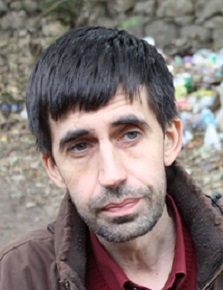De Roemeense schrijver, journalist en literair criticus Iulian Ciocan werd geboren op 6 april 1968 in Chisinau, in de toenmalige Sovjet Socialistische Republiek Moldavië. Hij studeerde in 1995 af met een graad in Roemeense taal en letterkunde aan de Universiteit Transilvania in Brașov, Roemenië. Zijn roman “Înainte să moară Brejnev” (“Voordat Brezjnev stierf”) werd in 2007 uitgegeven en vertaald in het Tsjechisch. Zijn roman “Tărâmul lui Saşa Kozak” (“Het rijk van Saşa Kozak”) werd in 2011 uitgegeven en is vertaald in het Slowaaks en het Frans. Een hoofdstuk uit zijn tweede roman werd opgenomen in de bloemlezing Best European Fiction 2011, uitgegeven door Aleksandar Hemon. In april 2011 werd hij uitgenodigd om deel te nemen aan het PEN World Voices-festival in New York. Sinds 1998 werkt hij als radio-commentator voor Free Europe in Chisinau. Zijn proza is gepubliceerd in literaire tijdschriften in de Verenigde Staten, België, Duitsland en Brazilië. Hij schreef ook twee boeken met literaire kritieken en publiceerde acht boeken met journalistiek werk. Hij is lid van PEN Club, Republic of Moldova. In 2015 verscheen de roman „Iar dimineata vor veni rusii“ („En in de ochtend zullen de Russen komen”).
Uit: And in the Morning the Russians Will Arrive (Vertaald door Alistair Ian Blyth)
“On the morning of 25 June 2020, Latin teacher Nicanor Turturica awoke later than usual. Not just because it was a Saturday, but because he had played online chess until after midnight, against an obstinate Australian, who flatly refused to admit defeat at the hands of a representative of some Lilliputian country. Nicanor Turturica idled in bed for a while, wondering at the much too dark cloud he could see through the window, and realised with alarm that his deep sleep had not banished his weariness. Yes, although he was still a man in the prime of his life, at the age of sixty, with increasing frequency he was bothered by a state of extreme tiredness, his eyes ached, and he suffered cramps. To blame, an obtuse physician had told him, was supposedly the Internet, and to be more precise, online chess, in which he had found solace after the sudden death of his wife. But how could he live without any refuge, after an accursed breast cancer had stolen away his younger wife? This was why, for a few weeks after the funeral, Nicanor Turturica had succumbed to alcoholism, and then, after a heated discussion on Skype with his daughter, who lived in the United States, the teacher discovered online chess, giving up vodka and wine. And after a while he met the mild and gentle Raya, a widow of sixty-two, who sold pies at the faculty canteen and whom he started to visit at weekends. The insatiable window would have liked to have sex every night, but what with his Latin lessons and online chess, that would have done him in altogether. And so he persuaded her that they should meet just once a week. Absence makes the heart grow fonder, as they say. But when it came to chess, he could not tolerate any absence. He would sit in front of the computer for hours on end, doing battle with opponents from every continent, accumulating victories with a grim determination worthy of a better cause and losing his temper after every defeat, which, of course, seemed to him stupid and unfair. But on the morning of 25 June Nicanor Turturica felt so exhausted that he abandoned any thought of turning on his laptop or the television set. Perhaps that opaque physician had been right when he claimed that his tiredness was caused by his sedentariness, by sitting in front of the computer and the television. “Life means movement!” the physician kept reminding him, a truth that only now revealed itself to him in all its grandeur. He had to get into shape as a matter of urgency; apart from anything else, that evening he was due to cast himself into the burly arms of Raia from the canteen, who made up for lost time with great ardour, draining him of strength. »

Iulian Ciocan (Chisinau, 6 april 1968)
